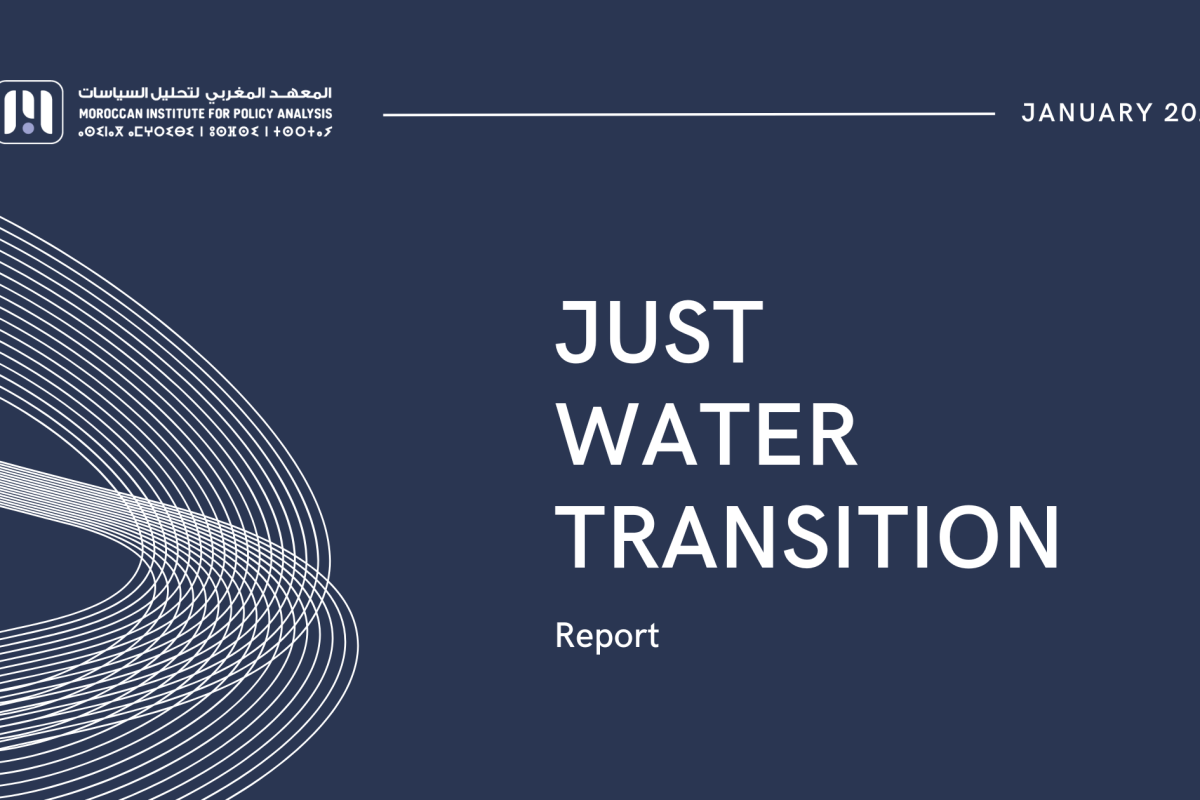[vc_row][vc_column][vc_column_text]
Compulsory Military Service aims to absorb youth dissatisfaction, yet it is unlikely to succeed in achieving this goal.
Download article
Introduction
On 20 August 2018, which marks the 65th anniversary of the Revolution of the King and the People, the Ministerial Council approved the Compulsory Military Service Bill. The new draft law targets Moroccans who are aged between 19 and 25 and it has set the duration of the service to be 12 months instead of 18 months that was in the Royal Decree of 1966. While the draft law grants the right to conscripts such as wages, compensation and health coverage, it does not provide for the right to conscientious objection, that is, the possibility of refusing to do service for conscientious reasons, instead it has imposed duties on them on the top of which is saving and protecting the secrets of national defense.
Since it was announced, the bill has generated widespread controversy in Morocco among those who support it, on the grounds that Compulsory Military Service may be one of the possible ways to socialize young people and strengthen their national identity and those who oppose it on the grounds that it may be a means to tame them. Even if this law won the support of the parliamentary groups, both majority and opposition, it was opposed by youth groups, such as the Football Ultras and some human rights organizations, in addition to high school students who came to protest in November 2018.
As a result of contrasting views, the Committee of Justice, Legislation and Human Rights inside Moroccan parliament decided to refer the bill to the National Council for Human Rights and the Economic, Social and Environmental Council in order to expand the public debate over this issue. However, the House of Representatives rejected the decision of this Committee on the grounds that the bill was approved by the Ministerial Council under the chairmanship of the King and hence king’s decisions are not questionable. The House of Representatives pointed out, in this regard, that the military and security matters must remain within the reserved domain of the King, similar to what has been done with other laws relating to the army, such as the Military Guarantees Act of 2012 and the Military Justice Act of 2014. The bill was ratified at the plenary session of the House of Representatives on December 27, 2018 after being discussed by the parliamentary groups.
This paper attempts to examine the reasons and backgrounds that led Morocco to return to compulsory military service as well as the possible and potential challenges facing this decision.
-
Background of Morocco’s Compulsory Military Service
In the last decades, there is a global trend towards the abandonment of compulsory military service, and more emphasis on the development of voluntary service for professional armies. Since the end of the cold war, around 24 European countries have abandoned compulsory military service, while 15 European countries are still operating under the same system[1]. Yet, in recent years, some countries have begun to consider returning to military service, and a public debate is being held in France, Britain and Italy against the background of some of the apparent reasons, such as the worsening of the geostrategic conflict with Russia since its intervention in Crimea in 2015, as well as the increasing perceived security threats, especially the radicalization of youth in Europe.
On the other side, some Arab countries have also chosen to re-operate with the same system such as Kuwait in 2017. Qatar on the other hand opted for compulsory military service for the first time in 2013, as does the UAE in 2014. Saudi Arabia also allowed the voluntary conscription of women for the first time in February 2018. This decision might be explained by context of the GCC conflict, especially the siege of Qatar and the UAE-Saudi war on the Houthis and their allies in Yemen, and the regional conflict with Iran, let alone the exacerbating demographic imbalance especially in UAE and Qatar[2]. The objectives of compulsory military are to strengthen the national identity and to break the traditional model of civil – military relations, which was established on the basis of separation in order to prevent coups and secure political systems[3].
For Morocco, the authorities have justified the decision to return to compulsory military service in a number of ways. Probably the most prominent ones include: first, strengthening national identity, enhancing the values of discipline and responsibility among Moroccan youth, and educating on respect for institutions. The King’s speech has detailed this at the opening speech of parliament in October 2018, when he stressed that military service “enhances the sense of belonging to the homeland. It also gives access to training which opens up opportunities for the professional and social integration of qualified conscripts who demonstrate a sense of responsibility and commitment.”[4] Second, compulsory military service aims at helping the promotion of social cohesion and integration among young Moroccans, especially in the shadow of increasing regional (Riffian, Sahrawi, …) and ethnic (Arab, Amazigh…) tensions. Third, the use of compulsory military service might be a channel for recruitment for the various security services, such as police, auxiliary forces, fire-fighters and prison administration. Fourth, the army will contribute to the rehabilitation and employment of unemployed youth, especially if the emphasis during the military service is placed on vocational and technical training.
In fact, an in-depth view of the motives for the reintroduction of compulsory military service reveals that it’s beyond before-mentioned reasons. Building a military reserve force does not seem to be an urgent priority for Morocco as it was not mentioned in the political discourses nor there is a special situation that push Morocco to do so. Hence the internal context may give a stronger meaning to this bill that was not included in the government program and was suddenly announced in the summer of 2018.
The year 2017 and 2018 were characterized by widespread public discontent. It started in October 2016 in the Rif region, then the protests moved to the province of Jerada in January 2018. The authorities have responded with violence to these protests and arrested and then trials of hundreds of activists[5]. Furthermore, in April 2018, the boycott campaign succeeded in mobilizing hundreds of thousands of citizens to boycott three large companies. Moreover, during the second half of 2018, the phenomenon of protests inside football stadiums was intensified by the “ultras”.
It can be seen from this perspective that the main motives behind the decision to restore compulsory military service are essentially of a political and social nature. Politically, the decision came in the wake of growing social protests, of which youth are the main fuel. The Rif Hirak is a model of the new generation of protests known by Morocco, which erupt for reasons of dignity and social justice, in which the means of social communication play the role of starter and instigator. All of this comes at a time in which the role of intermediate bodies such as political parties, trade unions and civil society has declined, which made “the state in the face of the street”[6]. Socially, the youth who are the fuel of these protests are victims of unemployment, poverty and marginalization, making them vulnerable to various security threats. According to a study by the Economic, Social and Environmental Council[7], the majority of young Moroccans aged between 15 and 34 remain on the “margin of sustained economic growth that the Kingdom has experienced over the past 10 years.” Unemployment in this category is 20 per cent, while 50 per cent are employed in low-wage and non-contributory jobs, and two-thirds of the same category has dropped out of school.
-
Challenged facing the return to compulsory military service
Regardless of the declared objectives, it was notable the resistance the draft compulsory military service bill has faced since it was first announced. On August 25, 2018, five days after the bill was approved by the Ministerial Council, the “Youth Gathering against ِCompulsory Military Service” was established, which called for the rejection of military service for several reasons[8]: First, “the government is not completely clear about its real objectives” and “the speed/rush the bill has been dealt with in passing while more pressing bills that are still on the shelves”. Furthermore, the draft law was neither at parties’ electoral program, nor in the government program voted by the parliament”. In addition, human rights organizations criticized the draft law. The Moroccan Human Rights Association (AMDH) considered that its contents “are contrary to freedom of thought and conscience” and called for the “recognition of the right to conscientious objection to military service” in Moroccan law, as well as providing the legislative protection of conscientious objectors, based on doctrinal or humanitarian beliefs”[9].
Subsequently, fans of sports teams or the so-called “Ultras” have adopted the same position. For example, in January 2018, Ultras Helala, a fan group of the Kenitra club team, raised slogans above the football stadiums, refusing to military service[10]. This was a trend that has come in the context of growing protests among the Moroccan “Ultras” groups with songs and slogans criticizing the absence of social justice, as these groups emerged as a vehement protest force against government policies.
In the same context, the student protests against the “GMT + 1” in November 2018 expressed a rejection of the reintroduction of compulsory military service, as evidenced by raising slogans criticizing the bill for targeting millennials instead of providing them with schools and education reform[11].
As a result of these objections of different social categories, the House of Representatives decided to refer the draft law on 10 September 2018 to the Committee of Justice, Legislation and Human Rights in lieu of the Foreign Affairs and National Defense Committee. The latter is competent to study everything related to issues of national defense. The office of the Council justified this move by the fact that the contents of the bill intersect strongly with the human rights field. In a second step, members of the Justice, Legislation and Human Rights Committee unanimously decided to refer the draft law to the National Council for Human Rights and the Economic, Social and Environmental Council to express opinion and advice on the pretext of broadening the public debate on the bill because public opinion was not given enough time to understand it.
However, this step did not reach its desired goal, as the House of Representatives decided to reject the decision of the parliamentary committee to refer the draft law to the National Council for Human Rights and the Economic, Social and Environmental Council, on grounds that lie in the desire to keep military issues within the domain reserved for the King. It seems that this decision is linked to the return of calm to the street, especially after the staging of student protests[12].
For all these reasons, it seems unlikely that the parliament would responsd to the demands of those who objected to military service, despite the decision of the “Moroccan Community against Compulsory Military Service” to organize a protest on January 15, 2019, supported by human rights and youth bodies that see the real goals of the project are aimed at “systematic disciplining of youth demanding freedom, dignity and social justice” and to “put then in the military barracks”[13].
Conclusion
It seems that the government is passing the controversial bill in the parliament, as happened with the Basic Safeguards Law granted to the military in 2012, regardless of the objection of some human rights organizations and youth. In the foreseeable future, this project may succeed in neutralizing some of the young people active in social protests, but this will be relative and limited in scope, given that the social and economic challenges, especially the problem of youth unemployment, are bigger than a law or measure. Therefore, in the long term it is unlikely that the military service will succeed in absorbing the anger of unemployed and marginalized youth, not because of the resistance it has suffered so far, but because the young people who enter the labor market every year are estimated at hundreds of thousands. This requires more radical and deeper solutions to the problem of integrating youth.
Footnotes
[1] Matthias Bieri, Compulsory Military Service in Europe: New Relevance, Center for Security Studies, October 2015, article published on the following website: http: //www.css.ethz.ch/content/dam/ethz/special-interest /gess/cis/center-for-securities-studies/pdfs/CSS-Analyse180-FR.pdf
[2] Mohammed Badri Eid, Conscription dans les États du Golfe: priorités stratégiques et défis, Centre d’études Al Jazeera, 27 octobre 2017. http://studies.aljazeera.net/mritems/Documents/2014/10/27 /201410279843914734Gulf.pdf
[3] Eleonora Erdmani, Conscription in the New Gulf States, Carnegie Middle East Center, 25 April 2018. See http://carnegie-mec.org/sada/76179
[4] Royal Speech before Parliament on 12 October 2018, see the following link: http://www.maroc.ma/en
[5] Human Rights Watch, Torture Suspects Disfigure Collective Trials, 30 November 2018, at the following link: https://www.hrw.org/en/news/2018/11/30/324664
[6] Mohamed Masbah, What Protest in Morocco Reveals about Public Trust in Political Parties, Moroccan Institute for Policy Analysis, 11 September 2018. On the following link: https://mipa.institute/5834
[7] Economic, Social and Environmental Council, New Integrated National Initiative for Moroccan Youth (Report), No. 23/2018, p. 25.
[8] Communication of the Youth Gathering against ِCompulsory Military Service, 25 August 2018. http://marayana.com/laune/2018/08/27/1391/
[9] Yusuf Lakhdar (editor), An Association calling for recognition of the right to refuse conscription, 14 September 2018, at the following link: https://www.hespress.com/societe/405339.html
[10] See Akhbar Alyaoum, No. 2740, 10-11 November 2018.
[11] Azzedine Maqsat (ed.), The student movement against GMT+1 .. Details of an “exceptional” day of protest in Rabat, today 24, 12 November 2018, at the following link: http://www.alyaoum24.com/1172838.html
[12] See more details in Akhbar Alyaoum, No. 2777, 25 December 2018.
[13] – Noureddine Eggan (ed.), Opponents of Conscription, rally to protest and seek the support of Moroccans, available at the following link: https://www.hespress.com/societe/412819.html
[/vc_column_text][/vc_column][/vc_row]
Smail Hamoudi
Dr. Ismail Hammoudi, holds a PhD in political science from the University of Mohammed V in Rabat in 2018, on Morocco’s security policy. He is currently working as a political science professor at the Multidisciplinary Faculty of Taza, Sidi Mohamed Ben Abdellah University. Dr. Hammoudi published several studies in scientific journals, as well as articles in research centers. He was previously a journalist and is still an opinion writer for "Al-Yaoum 24" and "Akhbar Al-Yaoum" newspapers.


